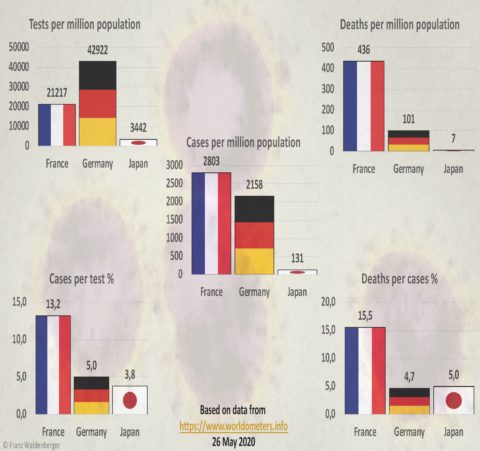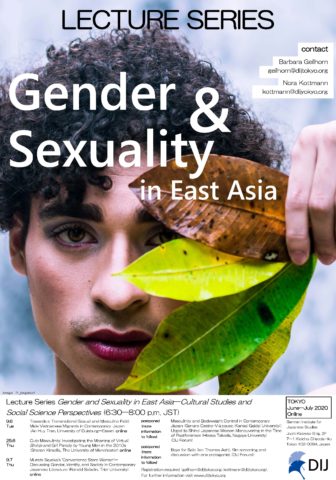Events and Activities
Economic Policy Responses to the Covid-19 Crisis in the Euro Area and Japan
 DIJ DWIH Web-Forum
DIJ DWIH Web-Forum
Governments and central banks all over the world have taken historically bold fiscal and monetary policy measures to fight the dramatic, yet still not fathomable economic impact of the Covid-19 crisis. While the announcements have certainly calmed sentiments of market participants, many important questions remain as to how the proposed measures are to be implemented effectively given their gigantic scope and the lack of precedence. Actions need to be taken in a timely manner, as the impact of lockdowns, social distancing and travel restrictions is being felt immediately, and they need to be targeted accurately, because the economic impact varies extremely across industries and households. The speakers in our web-forum will address these concerns by taking Japan and the Euro area, especially Germany as examples. Details
Speakers:
Masaaki Shirakawa, former Bank of Japan Governor (2008-2013)
Volker Wieland, member of the German Council of Economic Experts
Moderated by Yuri Okina, Chairperson of The Japan Research Institute
Webinar on ‘Tokyo Olympics Postponed: How Japanese Society Responds’
 Originally scheduled to begin on July 24, 2020, the Tokyo Olympics have been postponed to July 2021. This is a dilemma: The Olympics were supposed to present a brand-new Japan to the world, a leader in sustainability, diversity, inclusion, and a slew of other admirable goals. But almost overnight, Tokyo’s buzz of Olympic logos, countdown clocks and construction hustle have come to an eerie standstill: What now? Watch sociologist and DIJ deputy director Barbara Holthus, editor of Japan Through the Lens of the Tokyo Olympics and Ulrike Schaede, former member of the DIJ’s advisory board, in this UC San Diego Japan Forum Webinar to learn how the postponement has affected the various stakeholders in society: athletes with crushed aspirations, para-Olympians with broken dreams, disappointed volunteers, empty-handed ticket holders, devastated inn- and shopkeepers, jubilant anti-Olympic movement participants, among Tokyoites and in the periphery. The video of this event is available on You Tube (link).
Originally scheduled to begin on July 24, 2020, the Tokyo Olympics have been postponed to July 2021. This is a dilemma: The Olympics were supposed to present a brand-new Japan to the world, a leader in sustainability, diversity, inclusion, and a slew of other admirable goals. But almost overnight, Tokyo’s buzz of Olympic logos, countdown clocks and construction hustle have come to an eerie standstill: What now? Watch sociologist and DIJ deputy director Barbara Holthus, editor of Japan Through the Lens of the Tokyo Olympics and Ulrike Schaede, former member of the DIJ’s advisory board, in this UC San Diego Japan Forum Webinar to learn how the postponement has affected the various stakeholders in society: athletes with crushed aspirations, para-Olympians with broken dreams, disappointed volunteers, empty-handed ticket holders, devastated inn- and shopkeepers, jubilant anti-Olympic movement participants, among Tokyoites and in the periphery. The video of this event is available on You Tube (link).
DIJ research presentations at SASE Virtual Conference

DIJ research fellows Susanne Brucksch and Markus Heckel will participate in the 32nd Annual Meeting of the Society for the Advancement of Socio-Economics (SASE). This year’s meeting will be held online from July 18-21.
Susanne will participate as a discussant in the Roundtable “Economy, Society, Polity: Global and National Health(care) Lessons from the Covid-19 Pandemic”. She will also present her paper “Innovation Activities through Medtech Partnerships in Japan?” which highlights current efforts to increase medtech partnerships, cluster policies and matching-hubs to cross disciplinary and organizational boundaries and to encourage innovation activities in the field of medical devices in Japan.
Markus will present two papers: “Deflation – Lessons from the Japanese Experience”, co-authored with DIJ director Franz Waldenberger, applies the quantity theory of money and international arbitrage conditions. It suggests that expansionary monetary policies are very limited in fighting deflation in Japan. Markus’ paper “Central Bank Communication under Unconventional Monetary Policy: The Bank of Japan during Times of Crisis” analyzes the monetary policy and central bank communication of the Bank of Japan during 2003-2019 with a focus on the global financial crises and the Fukushima nuclear disaster. Results show that the complexity of monetary policy can be reduced to forms of “general” monetary policy with quantitative easing and short-term liquidity emergency measures used in crisis times.
Future Visions of a (Digital) Public Sphere:
Findings from Japan

With the pandemic since early 2020, the use of online platforms has increased in most societies. Consequently, providers of digital platforms have gained substantial influence on how people inform themselves, for example about the novel coronavirus or political topics. However, many posts and publications include falsified or unproven data (better known as “fake news”), also in Japan. In the course of our research we raise the question how the status quo and the future of the aforementioned digital platforms can be explored collectively with regards to issues like fake news, democratic values or privacy. We argue that the resulting scenarios, which arise from the subjective experiences of their speculators and, hence, reveal individual hopes and fears, allow us to explore and discuss utopian and dystopian visions of technological futures and alternative realities. Details
Speakers:
Michel Hohendanner, Munich University of Applied Sciences
Chiara Ullstein, Technical University of Munich
Murata Sayaka’s Convenience Store Woman: Discussing Gender Identity and Society in Contemporary Japanese Literature
Lecture Series ‘Gender and Sexuality in East Asia’ (3/5)
A convenience store is a reflection of Japan’s society. The way people behave, act, react, and interact is a display of contemporary Japan’s common sense. It reveals how social life is organized in terms of interpersonal relations, habits, norms, values, etc. What, however, happens when someone does not fit Japan’s common sense? This presentation will elaborate on how Murata addresses the fundamental question of an individual’s place within society by focusing on how the novel deals with social conventions, gender constructions, and work. The analysis of these issues shows how Murata deconstructs Japan’s common sense and reveals its naturalized, unspoken, and taken-for-granted rules that organize contemporary Japanese society. Details
Speaker:
Ronald Saladin, Trier University
Cute Masculinity – Investigating the Meaning of Virtual Shōjo and Girl Parody by Young Men in the 2010s
Lecture Series ‘Gender and Sexuality in East Asia’ (2/5)
Around 2010, cute male characters, drawn visually identical to bishōjo (beautiful girl) characters, moved beyond erotic computer games (erogē) and into cosplay and cute cross-dress fashion subculture, on campuses and online. By the middle of the 2010s, M2F cute and girlish boys were also a tangible theme in advertising and major media production. The well-trained bodies and willing faces of young girls lining screens and interfaces in the city, became infiltrated by male talents and pop idols in cute cross-dress. This paper explores the pick-up and adaptation of cute as a male visual aesthetic in subcultural practices and fashion and considers its complex play with transformation and masculine identity. Details
Speaker:
Sharon Kinsella, The University of Manchester
How Real Are Numbers?
Making Sense of National COVID-19 Statistics
 DIJ MFJ Web-Forum
DIJ MFJ Web-Forum
The number of infections, reproduction numbers, doubling speeds, death rates: national pandemic statistics are updated, compared and discussed daily. The numbers are shocking, but so are the huge national differences. Why are there so few people infected in Japan? Why is the death rate in Germany so low? Why is the situation in France so bad? For sure, countries apply different testing and reporting methods. Simple comparisons are likely to be misleading. Nevertheless, these numbers are relevant as they influence important policy decisions. In our Web-Forum we ask leading experts in the field from France, Germany, and Japan to explain the apparent differences in national data related to the COVID-19 pandemic and what the numbers can really tell us about the situation in the three countries. Details
Speakers:
Ansgar Lohse, University Medical Center Hamburg-Eppendorf
Paul-André Rosental, Sciences Po Paris
Kenji Shibuya, King’s College London
You can access this online event here: https://www.youtube.com/watch?v=YnOfeA8nbts
Lecture Series: Gender and Sexuality in East Asia – Cultural Studies and Social Science Perspectives
 This lecture series sets out to explore ‘Gender and Sexuality in East Asia’ from a cultural studies and social science perspective. It is structured as a set of three online lectures to be followed by a DIJ Forum and a film screening and talk with the producer and one protagonist (dates t.b.c.). Topics that will be addressed are: Sexualities and migration, ‘new’ masculinities, ‘new’ life courses for women, gender constructions in film and literature, bodies and postfeminism.
This lecture series sets out to explore ‘Gender and Sexuality in East Asia’ from a cultural studies and social science perspective. It is structured as a set of three online lectures to be followed by a DIJ Forum and a film screening and talk with the producer and one protagonist (dates t.b.c.). Topics that will be addressed are: Sexualities and migration, ‘new’ masculinities, ‘new’ life courses for women, gender constructions in film and literature, bodies and postfeminism.
Online Lectures
An Huy Tran, University of Duisburg-Essen/Waseda University: ‘Towards a Transnational Sexual and Masculine Field: Male Vietnamese Migrants in Contemporary Japan’ (9 June)
Sharon Kinsella, The University of Manchester: ‘Cute Masculinity: Investigating the Meaning of Virtual Shōjo and Girl Parody by Young Men in the 2010s’ (25 June)
Ronald Saladin, Trier University: ‘Murata Sayaka’s ‘Convenience Store Woman’ – Discussing Gender Identity and Society in Contemporary Japanese Literature’ (7 July)
Join us to discuss these issues with internationally established scholars! Further information, incl. technical details will be announced here and on Twitter (@dij_tokyo) in due time. Download Poster





 Open Access
Open Access
